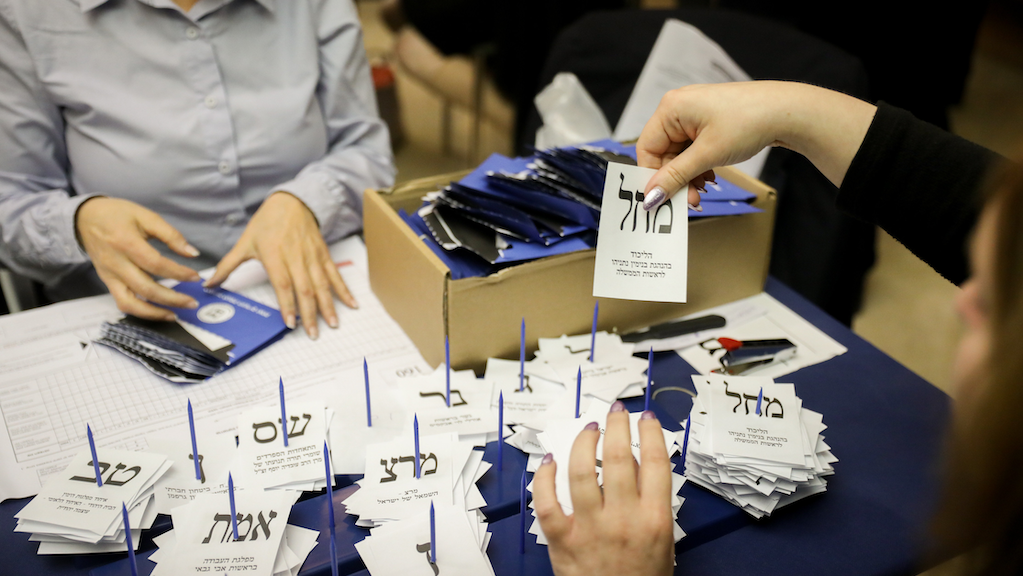New Israeli elections don’t solve stalemate in coalition forming
The second Israeli parliamentary elections in one year are likely to yield a new winner in the form of the Blue and White party, a partnership of three secular parties on the left and center of the political spectrum in the Jewish state.
After all votes, with the exception of IDF soldiers were counted manually, the party of Benny Gantz, Moshe “Boogie” Ya’alon and Yair Lapid turned out to have one seat more than the Likud Party of current Prime Minister Benjamin Netanyahu.
Netanyahu, the longest-serving Prime Minister in Israel’s history and his Likud party won 31 seats, a loss of four seats compared to the April election.
Blue and White became the largest party with 33 seats, a loss of 2 compared to April.
This does not mean that the game is now over and that Israel will soon get a new government that will end the ten-year reign of Netanyahu.
The more than 8 percent uncounted votes by IDF soldiers could still give Likud an extra seat and the same goes for Yamina since the majority of the soldiers tends to vote for the right-wing bloc.
The left-wing bloc to which Blue and White belongs includes the Democratic Union, which only won five seats, and the Labor Party, which formed a union with the Gesher party prior to the elections.
The Gesher-Labor merger won only six seats – a historic low for the party that ruled Israel for decades since the founding of the state.
In total, the center-left block won only 43 of the 120 seats in the new Knesset and is not even able to form a majority government with the help of the joint Arab list which won 13 seats.
On the other hand, the right-wing bloc led by Likud won a disappointing 55 seats so far – Yisrael Beiteinu not included – and is expected to encounter similar problems to form a majority government.
The natural coalition partners for Likud are the Sephardic Orthodox party Shas (9 seats), United Torah Judaism, an Ashkenazi ultra-orthodox party with 8 seats, and Yamina (national religious – 7) and until recently Yisrael Beiteinu, which became the biggest winner of the elections with 9 seats, a gain of four compared to April.
Yisrael Beiteinu was part of the government which Netanyahu formed in 2015 and until recently was regarded as a natural coalition partner despite political differences with the three religious parties.
The party of the Russian-speaking Avigdor Lieberman quit Netanyahu’s government in November 2018 because of a disagreement about a law that sought to impose mandatory military conscription for ultra-orthodox Yeshiva students. The difficult personal relationship between Netanyahu and Lieberman also played a role in the background, however.
Lieberman now wants a national unity government of secular parties that should consist of Likud (without Netanyahu), Blue and White and Yisrael Beiteinu.
Blue and White leader Benny Ganz and other prominent politicians of the new party have also ruled out the formation of a government with Likud as long as Netanyahu is the leader of the party.
The current Prime Minister is extremely unpopular among the Blue and White leadership who also argue that Netanyahu is not acceptable for them since there’s a chance he will be indicted for alleged corruption.
Prominent Likud members have already indicated that they have no intention to drop Netanyahu as party leader and with that, the formation of a government of national unity looks an extremely complicated matter.
The possibility that Blue and White will form a government with the united Arab list does not seem realistic either because Ganz has torpedoed this idea the moment it came up. Ganz has stated that the anti-Zionist Arab party cannot be part of any Israeli government.
Likud shares that view and will under no circumstances form a coalition with Arab parties that are considered hostile to the Jewish state.
On the other hand, almost all parties have made it clear that they do not want repeat-elections again which most likely will not solve the current stalemate in the coalition forming.
Yisrael Beiteinu is therefore expected to assume the role of kingmaker in the coalition forming process once again.
The possibility that Lieberman will enter a center-left coalition can also not be ruled out because he is essentially a pragmatist.
If that happens Ganz, Ya’alon, and Lapid would still not have their desired majority government and the chance that Yamina would join such a coalition is virtually zero.
If Ganz will receive the mandate to form a new government he will have to consult with his fellow party members about what to do with Netanyahu whose position within Likud seems unassailable.
The problem with Netanyahu could, however, be resolved the moment the current Prime Minister will be indicted after a court hearing in October.
In that case, prominent Likud members will probably be more open to the idea of appointing a new party leader.
Another possibility is that the Labor Party will, under certain conditions, become a member of a new rightwing Netanyahu government because Orly Levy, the leader of the Gesher party who merged with Labor, adheres to right-wing security positions especially vis a vis the Palestinian Arabs.
Blue and White does, furthermore, not have any essentially different positions on national security than Likud, and this is still the most important issue in Israeli politics.
Ganz is in favor of continuing the Israeli policy towards Iran and also doesn’t oppose the introduction of Israeli sovereignty over the Jordan Valley.
Blue and White is, however, against Israeli sovereignty over the Jewish villages and towns in Judea and Samaria, the so-called West Bank and still supports the so-called Two-State-Solution.




